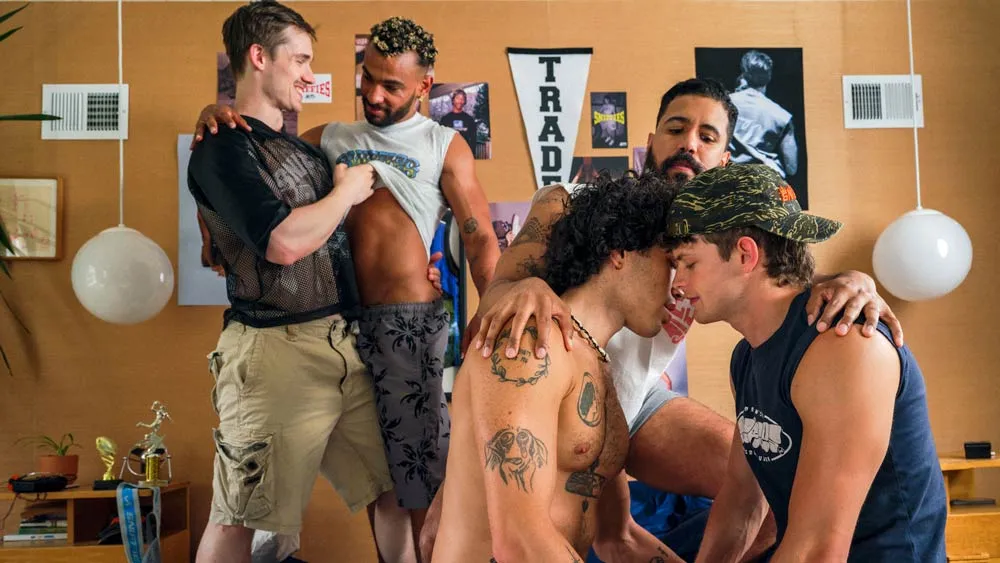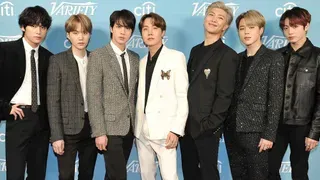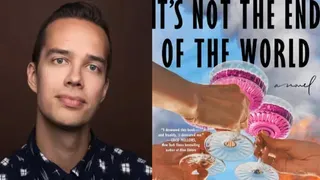May 11, 2011
Jodie Foster leaves it to 'The Beaver' (and Mel Gibson)
Robert Nesti READ TIME: 8 MIN.
"The Beaver", the third directorial effort by two-time Oscar-winning actor Jodie Foster went into limited release last weekend with some considerable offscreen baggage. The reason? Mel Gibson, who stars as a middle-aged businessman who recovers from a serious depression through the help of a hand puppet - a beaver who speaks in a Cockney accent a la Michael Caine. Foster co-stars in the film as his wife, who is skeptical of this kind of unusual therapy, but gives in when it revitalizes Gibson to return to work and his family; that is until the Beaver begins to take over their lives.
Whether or not Foster's recent press trip promoting the film came as a result of her wanting to defray attention from the scandal-prone Gibson is mere conjecture. Whatever the reason, she was sharp, funny and personable at a recent round-table press conference, fielding questions about a film with ease and impressive intelligence. Off-screen she looks younger and more relaxed than she does on-screen in the film (which makes sense considering she plays a woman dealing with a husband who only communicates through the Beaver hand puppet he wears).
A struggle
When the film was screened in March at the South by Southwest Festival in Austin, TX, Foster said that the film was one of the biggest struggles of her career. Not just from the difficulties of bringing the unusual script to the screen, but in bringing the film to market with its once A-List, now toxic star.
"There isn't much I could do about Mel's choices," she said." And those decisions about whether the film will be distributed and how it will be distributed are not my decisions to make. Honestly that the wonderful thing about being a director is that you actually get to ave this piece of film that says this is what I love, this what I believe in. That's great - everything else is someone else's problem."
She was, though, unequivocal in her faith in Gibson, whom she worked with on "Maverick" 17 years ago where they became close friends.
"On the set he is the most beloved actor I ever worked with. We have the perfect working style together.
"And," she continued, "he really gets it. And that's what I've known about him - that he works in two different styles. He has wit and can be very light on his feet. He understands comedy. But his heart really understood this movie from the beginning - the struggles that this man is going through. And he always had his eye on that - his eye on the drama. And anytime it veered off into a more jaunty, comedic way, he kept bringing it back."
Story continued on following page.
Watch the trailer to "The Beaver:"
A satire? An inspirational drama?
That the film is unusual is an understatement, which has led to some confusion as to just what kind of film it is - a satiric comedy? An inspirational drama? A horror film? In actuality it contains all of these elements which are smoothly integrated by Foster into a sleek whole.
"I know it is not a movie for everybody," she said. "And it's a very specialized subject matter. It is treated in a very special way. We know it's a specialized release. And that's scary, because there are people who just don't like the movie, and there are people who will say, 'Why isn't it a comedy?' And I understand that. But there are other movies that fill that function, not just this one."
Central to "The Beaver" is a serious look at how crippling depression can be, both to the individual it effects and to those around him. "Obviously the main character is chemically depressed and requires a lot more than talk therapy. This isn't just about a man who is sad. This man is suffering from a medical condition and he needs help beyond his abilities. He can't stop sleeping and can't get out of bed - that's serious. What we know about every day life is that it gets heavier and heavier as life goes on. And there's a lot of tragedy mixed in with the comedy of our lives. And that many of us myself included go through these moments of spiritual crises where they feel all alone - terribly alone."
Yet Foster sees depression as a component in some artists' lives in their creative process. "There is an interesting phenomenon about artists, perhaps it is a clich�, is that we are very often excessive ruminators. Great writers are people who - they don't just type it and it comes out of the typewriter and it is fabulous - they think about it and they rewrite it and they think it can be better and add those details - the process of ruminating is beautiful, but it is also incredibly painful. But it is one thing that allows you to get through the spiritual crisis and evolve through it. Other people will just go to the beach and not evolve through those constraints. So it has a function. Depression has a function. In a weird way I feel lucky that I have the ability to find myself."
One of the key decisions Foster made after signing on to direct was also one of the more difficult - deciding to co-star as Gibson's wife. " I remember saying after 'Little Man Tate,' 'I'm not doing this again.' And Mel and I always made jokes about that because he did 'Man Without a Face,' and I said, don't do it again. And he said, I know. Then he did 'Braveheart' and he was in every scene with full-on make-up and extensions. That was like a crazy thing for him.
"I don't think it is a wise idea for most people. But the reason I did it was when brought on Mel, I began to think, 'who am I going to get to play across from him?' I needed something specific for him and I felt that I didn't know who I was going to get. I needed someone to carry the weight of the drama and not to play into the comedy elements. Someone who has held a film together before and tell the story from the beginning to the end from the audience's point of view. I feel that we know each other so well and there's a real compassion between the two of us that people would believe that we were married on screen."
Fantastic title
Another key element in casting was choosing two of Hollywood's best young actors to co-star in the film: Anton Yelchin, who plays Gibson's estranged son, and Jennifer Lawrence, who plays the high school cheerleader with whom he becomes involved.
"She's just so good," Foster said when asked about Lawrence. "I saw a few scenes from 'Winter's Bone.' I had already interviewed hundreds of girls for the part and all of them were amazing actresses. I couldn't figure why I couldn't go with any of them , but once I saw Jennifer, I realized it was the character who was problematic and we went back and wrote it for her. She's amazing in this. She has that pain all over her face at 19. And trust me, she's a happy girl - a happy Kentucky girl. Bad things never happen to her. She just has that quality, I think, we don't question the fact that even though she's cheerleader something happened to her that marked her forever."
Central to the film is the relationship between Gibson and Yelchin, which Foster effectively portrays through cutting between them, showing their similarities and differences in visual terms. As it turns out, they interact very little in the film.
"We think about them a lot in the movie, but they are not on screen a lot together. In fact, they are in one real scene together. They are quite dissimilar as actors. That could be because Mel has been doing it for so long - some 40 years; Anton prepares minutely. I get five pages of notes. He makes all these intellectual decisions. He reads books about things and wants 15-20 takes so he has all these different options. Mel has a personality that's like mine, which is we do the research that's important. He has an instinctive approach He's a two-take guy and really doesn't want to talk about it. I get Anton because I like that intellectual process, but I identify more like Mel.
"And Anton is very interesting person. He knows more about weird foreign films. Tarkovsky. He reads 600 page books about economics - who does that? He's an interesting, odd person. His interests are in not waiting for someone to take his picture."
That notion of young actors and celebrity, brought on a question about what Foster thought of today's celebrity obsessed culture.
"It was different when I was growing up. There was a separation between who you were and your celebrity. News was not entertainment then. If I was 17 now, I wouldn't be actor."
What would she be if she wasn't an actor?
"I think about that all the time. My entire life - who would I be if I wasn't this? Would I be anything? Would I have any value whatsoever? It's a weird question. If you ever read books on prodigies, it's a question they always ask themselves. Would I have any identity? That's a big question for me? Would I have any identity if I didn't do this or if people didn't applaud what I did or recognize what I did, would I be anybody? Yep. That's many years of therapy for that one."
But back to "The Beaver", a title that has been the source of many one-liners over the past few weeks. Was that always the title?
"Yes. I think it is fantastic that it is as irreverent as it is. And that people kind-of wince when they remember it. And is almost painful when they say it. When I first started doing the movie, everyone would say to me, 'you're changing the title, aren't you?' But we love it and Mel loves it too."
"The Beaver" is in theaters in limited release. For more on the film, visit .
Watch this feature about "The Beaver":
Robert Nesti can be reached at [email protected].






